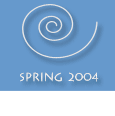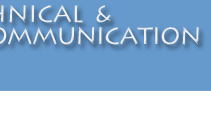



 |
Technology Responsibilities
Familiarity with technology is obviously an increasingly important part of professional and technical communication in the workplace. However, learning to use specific pieces of hardware and software is only part of the challenge. It is also critical that you take responsibility for developing strategies that will help you to make use of new features, applications, and technologies as they emerge.
While we will spend some time in class working with graphic design, page layout, and web-editing applications, this is not a course on software. You should keep in mind that you will likely need to spend several hours per week (4-6 hours on average) outside of class time learning and using various applications. Knowledge of and experience with a range of technologies will benefit you both in this course and in your future profession. There is no shortcut to becoming adept at utilizing technology to create effective communication, but the more effort you put into it, the more return you will see in the success of your documents.
For this course you will need to fulfill the following technology responsibilities:
- Have an active email account and check your email regularly for updates about course activities.
- Subscribe to the class listserv (eng3183-l@nmsu.edu). If you need instructions for how to do this, go to http://ict.nmsu.edu/listproc/userfaq.html
Note: You are responsible for making sure that your account gets subscribed and works. I'll send out a test message at the beginning of the second week.- Maintain back-ups and bring all electronic files (on CD RW) with you to every class so that you may work on them and share them with others.
- Demonstrate proficiency with Windows XP, email, and various course applications. This includes the successful negotiation of any platform or application compatibility issues.
- Consult the online course materials daily for information about course assignments and potential changes to the course schedule.
Assignments and Grading
Job Materials Project (30%)— After completing a professional inventory and a job analysis, you will then search for and respond to an internship/co-op announcement or job advertisement for which you will be qualified upon completion of your degree. Finally, you will create a suite of relevant job materials, including a print résumé, a scanable résumé, a cover letter, and a web portfolio.
Outside Client Project (50%)— Working with at least two other people, this multi-part project will be your most significant assignment. Each team will locate, investigate, and formally propose an outside client and set of deliverables. Working with a campus or community non-profit organization, teams will research, create, test, recommend changes, and revise appropriate communicative materials. Teams will deliver an oral report midway through the term on the status of their project. Each team member will also write a final report evaluating the successes and failures of the team’s project and experience.
Reading and In-Class Assignments (10%)- I have arranged readings from the course texts so that they can support the work required for particular projects and activities. I assign reading as a way of introducing communication issues and helping you to think about approaching and constructing your assignments. As I generally do not lecture about the text, I expect you to complete all assigned readings for a given day before coming to class, even if the material is familiar to you. We will often apply what you have read to discussions and class activities. Except for a few online articles and critical chapters, I will not assign written responses unless I get the sense that you are not reading.
Participation and Attendance (10%)— This class is designed to facilitate learning through participation and hands on practice, hence your daily attendance and active engagement in discussions, activities, and team projects are necessary. Additionally, since I recognize that coordinating schedules outside of class is often difficult, you will periodically have class time to work on assignments and meet with your project team. Take advantage of this opportunity by coming to class prepared and with all the necessary materials.
To do well in this course you will need to:
- be in class and be on time (more than four absences will lower your grade; more than six absences can result in automatic failure of the course)
- be a generous and enthusiastic collaborator during class activities, discussions, and group projects
- be thoughtful, critical, and timely in your approach to projects and revisions
A Note on Revision
I see the creation of any type of communication as a process in which the overall message improves through collaboration, attention to thoughtful critique, and work on multiple drafts. I encourage revision on all major course projects, even after a grade has been given. You may re-submit course projects for a higher grade as long as it represents a serious effort on your part to re-see or re-envision your approach to an assignment’s design and communication.
Late Work
The course schedule is arranged so that assignments build upon one another. This means it is important for you to turn in work when it is due. However, we all know that disruptive situations sometimes arise. With the exception of presentations or in-class activities (which cannot be made-up), I will accept late work only if prior arrangements have been made. To get an extension, you must email me or write a short memo asking for an extension AND proposing a reasonable deadline for completing work (which you then must keep). Failure to get an extension in advance will result in a lowering
Collaboration
The major project of this course requires you to work with at least two other classmates. I have done this not only because it reflects working conditions you are likely to encounter in professional environments, but also because it is an important way of learning. Each of you has different strengths, talents, and experiences which you bring to class. By working with others, you can pool these resources and hopefully create documents that are more effective and sophisticated than you might otherwise be able to do on your own. Although collaborative work can bring with it additional challenges, I believe that learning to negotiate these with others is a valuable part of your experience.
Academic Honesty
As computers and the web have made it increasingly easy to read, see, and borrow the work of others, what constitutes plagiarism has also become more difficult to define. This is even more problematic when it comes to issues of design and visual elements. However, any attempt to knowingly copy the work, ideas, or designs of someone else without giving appropriate credit to the source is plagiarism. Plagiarism is not only a serious academic offense, but it also cheats you out of learning, the prime reason you are here in the first place.
Disability
If you have or believe you have a disability and need reasonable accommodation for equal access to activities or resources in this course, you can contact the Office for Services with Disabilities located at Garcia Annex (646-6840). You may also want to discuss this in confidence with the instructor and/or the Director of Disabled Student Programs. All inquiries and notifications will remain confidential. For more information about the Americans with Disabilities Act (ADA), you can call 646-3635.